Local Reputation Marketing: How to Consistently Attract More Business
Reputation has always been critical to the success of any business. It's currency.
Whether you run a multinational corporation or a small local business, a great reputation is one thing all local business owners should strive to earn and keep!
Of course, on-the-ground, word-of-mouth reputation is important. But consumers base their decisions, now more than ever, on brands' online reputation. That means consumers are more likely to buy from you if they read enough good reviews about your products or services online.
Consumers take online recommendations seriously.
Research shows that 90% of consumers think online reviews are more important than a sales pitch or anything a salesperson might have to say.
87% of consumers need a brand to have between a 3 and 5-star rating before they buy anything from it.
And 84% of said reviews are "important" or "very important" in their purchasing decisions.
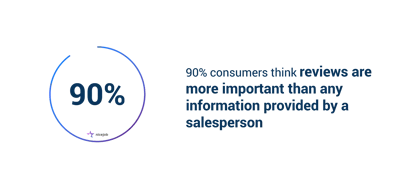
A business’s reputation is key to winning potential customers’ trust and having them pick you. But how can local businesses use positive feedback and reviews to turn customers into loyal patrons?
The answer is simple: local reputation marketing!
In this article, we'll explore how you can use your brand’s online reputation through digital to become top-rated and loved in your local community. We'll also highlight why you need a strong reputation marketing strategy. Let’s get started!
What is local reputation marketing?
Local reputation marketing combines brand marketing and reputation management in order to uses your company's reputation to attract new local leads and turn them into loyal customers.
It involves keeping a close eye on how customers perceive your brand and making decisive efforts to improve its reputation. Once your brand has built a solid reputation, you can use the positive perception of your products and services to attract new customers.
You can (and should!) use online reviews, local search rankings, five-star ratings, local community collaborations, testimonials, awards, and more to promote your business’s reputation and offerings.
What’s the difference between local reputation marketing and local reputation management?
Reputation management is the process of evaluating a brand’s online presence to see what people say about its products and services. It involves identifying negative reviews, comments, and queries and responding to them.
It's part of a proactive strategy to manage the brand’s reputation. By checking for positive and negative reviews and feedback, you can control the conversation online and offline. Local reputation management efforts also looks into improving your brand’s reputation crisis management. It consists of:
-
Monitoring online conversations
-
Responding to reviews and comments
-
Making changes within the business to improve customer experience
Reputation marketing is the process of using your brand’s positive reviews and impressions as marketing content. It involves using your company’s reputation to attract new customers and leads.
An example is when brands use positive online reviews left by customers as social media ads. The two parts of reputation marketing are:
-
Improving your brand reputation
-
Marketing your reputation to gain new customers
Further, local reputation marketing aims to attract new customers in a specific area. It uses positive reviews and testimonials as proof of the brand’s trustworthiness and the quality of its offerings.
Your Complete Guide to Reputation Marketing
Learn what Reputation Marketing is and how you can start using it today to grow your business and quickly get more reviews!
Get the guide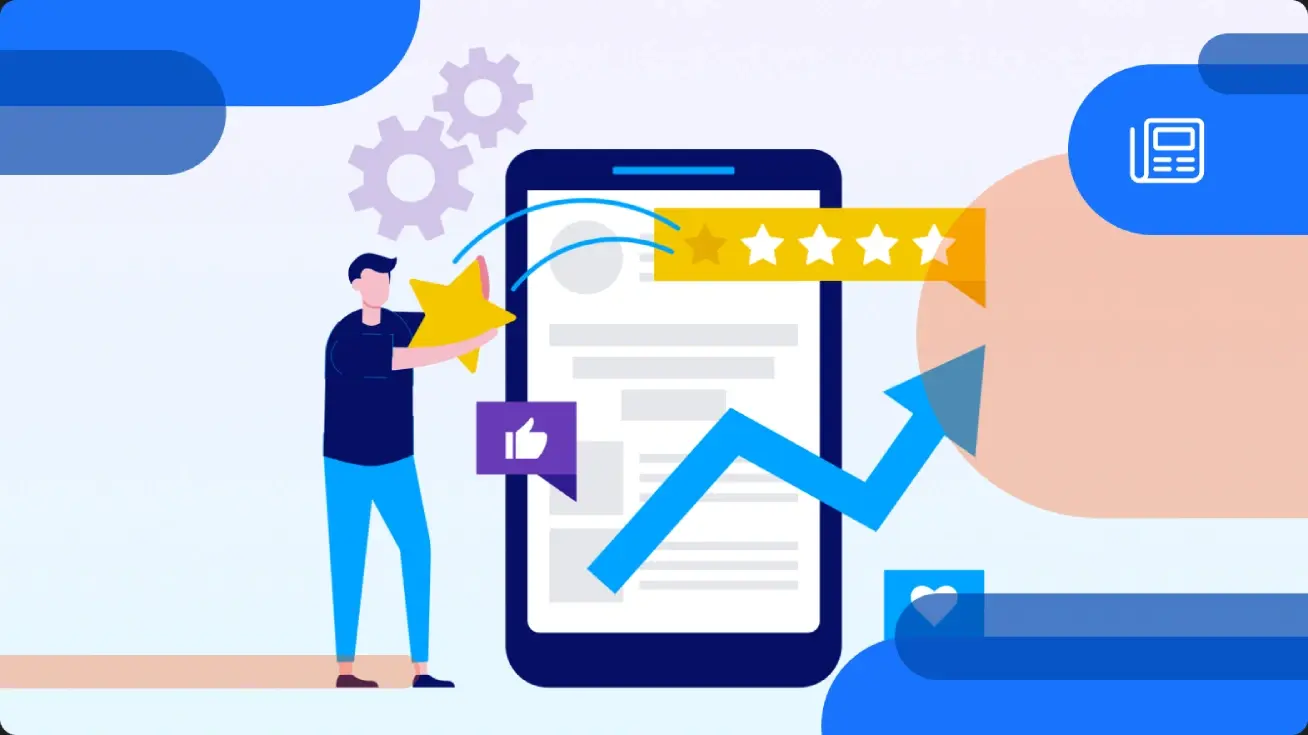
Benefits of local reputation marketing
You can use your positive online reputation in several ways. It can help boost your website traffic, social media engagement, local search rankings, and sales.
Let’s take a look at some of the main benefits of local reputation marketing in a little more detail.
Generate local leads
Part of doing local reputation marketing successfully involves optimizing your small business website and social media profiles.
Doing this right can greatly improve your ranking on location-based search engine results. It also ensures that your Google reviews are curated to attract potential local customers.
Let’s say you run a jewelry store out of Dallas, Texas and want to target the local population around you.
To increase the number of local leads, you must ensure that your name pops up right at the top so that when a customer runs a Google search to find an “online jewelry store in Dallas,” they should see your brand first.
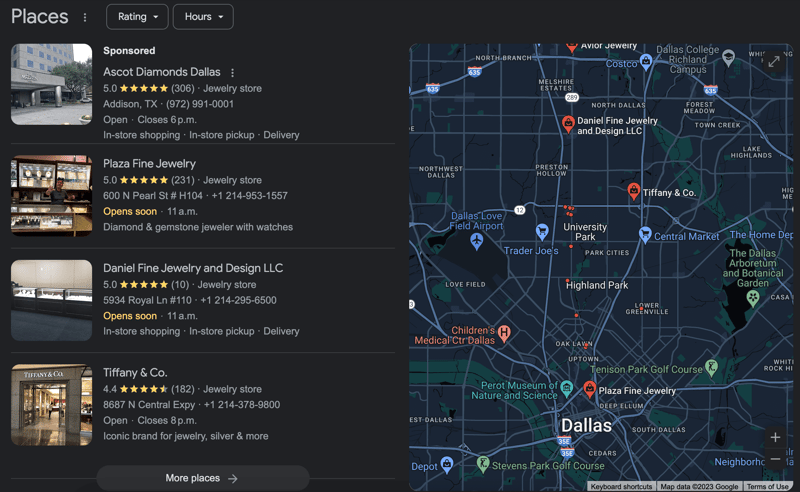
Ignoring the first sponsored ad, the local search results display the star ratings and the average based on how many people have rated those local jewelry shops.
Tiffany & Co. is an incredibly popular and national brand. However, with only a 4.4-star rating, someone might be willing to check out Plaza Fine Jewelry instead, all because it has a 5-star rating based on an even higher number of people.
Goes to show how important developing and nurturing your local reputation is!
Build credibility with positive reviews
Reading other people’s positive experiences with your brand will increases the chances of new customers giving you their business. Once customers read through many encouraging reviews, they'll believe you're a trustworthy brand.
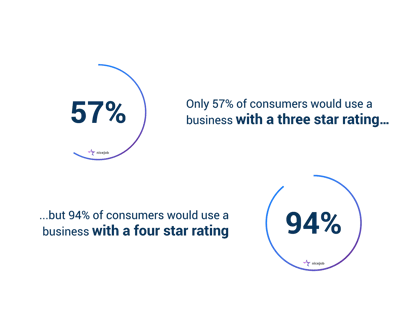
Most customers go through a local brand’s online presence before buying something. So you can use these platforms to your advantage as a marketing tool.
You can provide social proof to highlight your standing as a trusted business selling high-quality products. This can be in the form of reviews, ratings, and testimonials.
Try Social Proof today!
Gain credibility by showing website visitors honest reviews, recent bookings, real customer purchases, and more! No card required.
Optimize online presence
As you start online reputation marketing for your local business, you will need to polish your digital presence. Optimize everything from your social media pages and Google Business Profile to listing sites.
This could look like making sure your:
-
NAP (Name, Address, and Phone number), website, and brand identity is consistent across all platforms
-
Business is listed on multiple local directories
-
Website is set up to appear in local searches
For a deeper dive, check out how to do on-page SEO for small businesses and get the six tips you need to create a solid local search foundation to help your online reputation marketing.
Giving people a consistent experience as they explore the local business they want to choose will build trust and confidence that they'll receive the same high-quality service that you've provided to others.
Improve sales
A staggering number of people base their purchasing decisions on reviews and recommendations. So it makes sense that your sales volume will depend on the reputation of your business in the market.
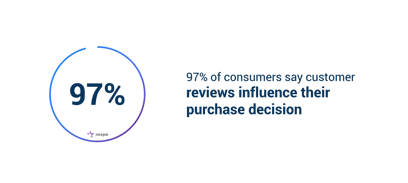
With focused local reputation marketing strategies, you will be able to get more leads and improve sales. Brands that maintain their positive reputation enjoy higher customer loyalty and retention.
This translates to better sales and more revenue.
How to use local reputation marketing to build trust in your local market
1. Use social media
Customers typically look up a brand’s social media profiles before purchasing a service.
Instagram, Twitter, Facebook, TikTok, LinkedIn — whichever one(s) you have, people also use them to write reviews, leave comments, and share feedback.
The best thing you can do as a brand is to engage with customers on social media and use the interactions to promote your business.
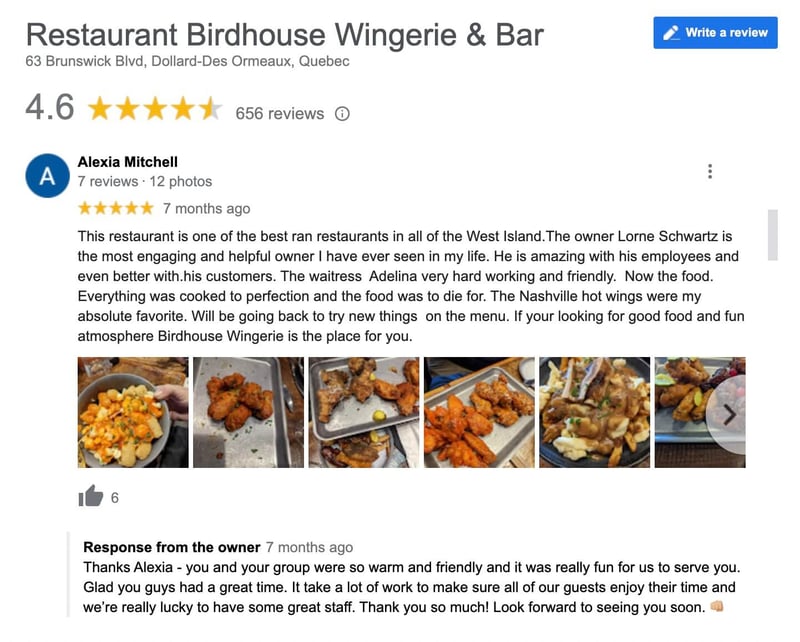
Social media allows for two-way communication with your audience, making it a powerful tool.
Talk to your customers and share their positive reviews on your pages. This social media tactic will help you enhance your reputation as an accountable and credible brand.
2. Include online reviews and testimonials in your marketing material
Ads, social media content, blogs, website copy, emails, whatever channels you use as part of your business strategy, sharing reviews and ratings from happy customers is a great way to elevate your reputation marketing!
If you're running paid campaigns like Google local service ads, use the text or video testimonials as the ad creative! This will show potential customers that others have trusted you with their business and have good things to say about you.
For example, this is one way that we use video testimonials on the NiceJob Instagram page!
Don't forget to use eye-catching visuals to make the ads stand out. Instead of just featuring text, incorporate the 5-star rating to add visual interest.
You could also share video testimonials or photos of customers enjoying your products.
3. Set up community partnerships
Getting involved in the community is a great way to earn credibility.
You can collaborate with a trusted neighborhood business or take part in local events such as fairs, sports tournaments, and things like that.
Such partnerships can help you access the customer base of other local businesses. You could publish an ad in a community newspaper or magazine to appeal to customers in the area.
Getting involved in charitable causes can be a reputation builder. For example, if you own a:
-
Hobby store, you can donate art supplies to a local youth group
-
Flower shop, you can offer greenery to help decorate a local event
-
Window cleaning company, you can offer one free service a month or quarter to a local business
Such acts highlight that your business cares about local social issues and is keen to help. As a result, this further encourages the community to support your business.
4. Join local business directories and listing sites
Customers vet businesses on a wide variety of platforms, including your website and social media pages. They would also look your brand up on local business directory sites to read feedback from other customers.
To leverage your reputation, you must create pages on such third-party websites. It's important to track customer reviews on such sites and respond to them on time.
5. Use Search Engine Optimization for local reputation marketing
If you want to appeal to a specific local community, you business must up when people search on Google for your products or services.
Effective local SEO practices include using relevant keywords and uploading location-specific content on your pages. This helps your website rank better on Google and generate local leads for your business.
It also includes getting high-quality Google reviews. As we wrote in How Online Reputation Marketing Improves Rankings, Traffic & Sales:
Google reviews are also a bit different than, for example, Facebook Recommendations... A review on Google will help your "discoverability" on the search engine, which will increase the amount of website traffic you get. This means you'll get a higher volume of customers through Google reviews than Facebook Recommendations.
The end goal should be that your brand pops up on the first page of a Google search, and customers only see positive content about your products.
At the end of the day, local reputation marketing aims to help you win over loyal customers in your local area.
Creating and executing efficient reputation marketing campaigns for your brand can go a long way in ensuring its success.
Want to try the best local reputation marketing software?
Seriously. According to Spring 2023 G2 awards, NiceJob earned the top rank in the Online Reputation Management software category for small businesses, beating out a whopping 52 competitors!
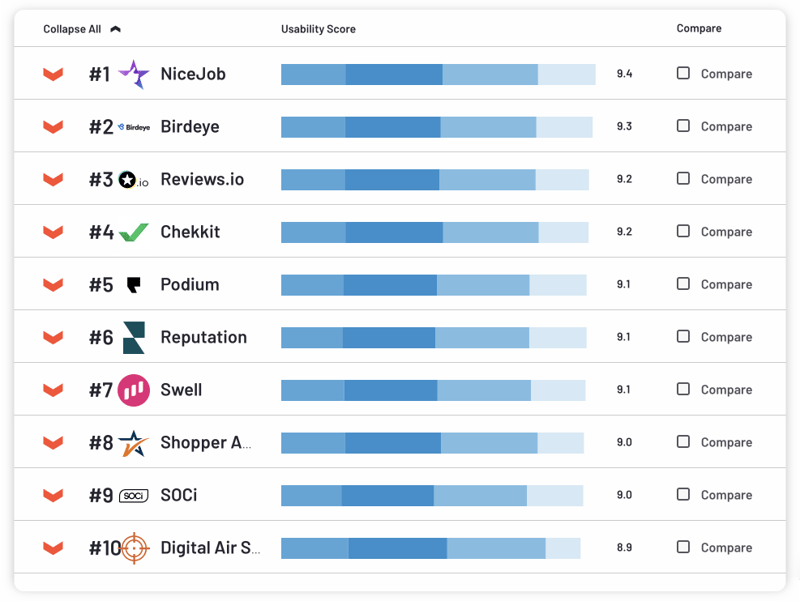
Become the top rated local business in your industry!
NiceJob's reputation marketing software will easily get you more reviews, referrals, and sales through word-of-mouth. 14-day free trial. No card required.
Start Free


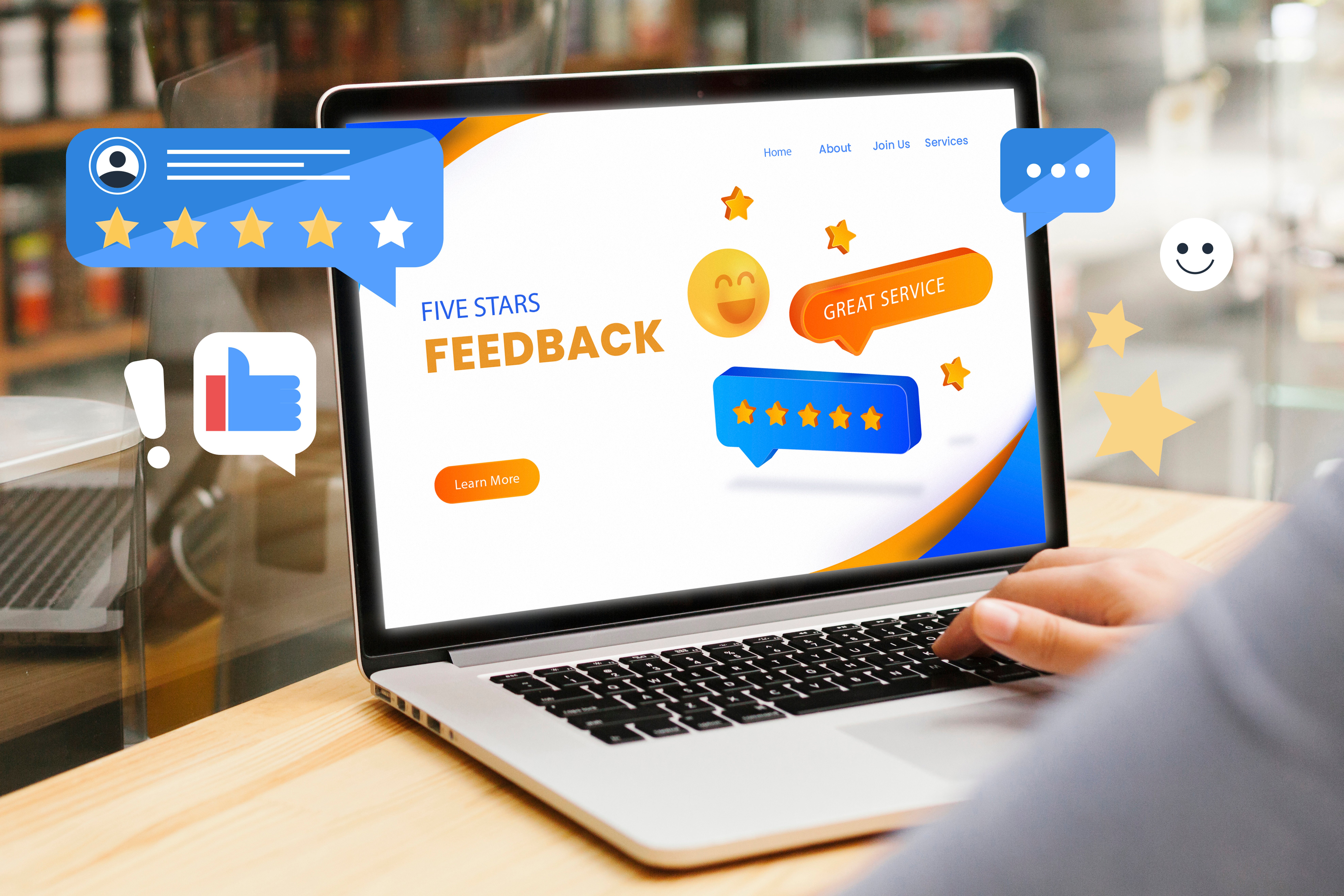
.jpg)
